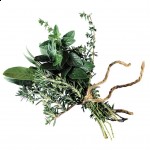 By David Judah
By David Judah
Recent years have seen an explosion of interest in the healing arts. Many have opted not only to make natural healing their therapeutic choice, but even to study for a career in alternative medicine. Then come the questions. Which profession? Which course? How long should I study for?
While many people are drawn to a variety of shorter courses such as reflexology and nutrition, the enthusiastic devotee searches for something long-term and life-changing. For those, the oldest of the healing arts, Herbalism, often springs to mind. Herbs have been used for millennia as humans’ first choice for medicine.
At its most basic level, herbal medicine is available to everyone. The common dandelion, for example, is a gentle yet effective diuretic. Nettles contain blood cleansing properties second to none. Some more mature readers will remember their grandmother’s bowl of nettle soup prepared judiciously every spring. Less commonly known, perhaps, is that hawthorn berries picked in the autumn and prepared as a decoction can benefit heart health. The elderflower yields benefits for the immune system that can compete with those of echinacea. The common comfrey leaf prepared properly as an ointment can heal wounds when applied. In fact, the average back yard, if unsprayed and left fairly as nature intended, can provide herbs to treat every organ system of the body.
Ireland has a rich tradition of herbal healing beginning in the Celtic era and inherited by the monasteries of the early Christian period. There is extensive documentary evidence of herbal practice by herbalists who studied and were apprenticed for ten years. This tradition continued down through the middle ages until the time of Cromwell. Medical texts in most European countries were generally written in Latin. Ireland, however, boasts a large body of herbal medical texts written in Irish (in other words, in the vernacular).
Nowadays, while most modern pharmaceutical drugs are made from plants, this is done by tampering with the plant to extract so called ‘active ingredients’. In contrast to this, herbalists have always used the whole herb, whether in a decoction, an infusion or a tincture. This time-honoured craft of natural preparation ensures the absence of side effects.
Of all the possible career choices in natural medicine, herbalism offers one of the broadest and most complete modalities. In the past, herbalists were the medical doctors. Nowadays, while modern medicine has developed wonderful ways to treat acute conditions and emergencies, herbal medicine can offer more effective treatment of the myriad of chronic and lifestyle related illnesses we suffer from. While it is advisable to call a doctor in the case of heart attack, it might be a wiser choice to visit an herbalist in order to seek the dietary advice and herbal remedies that can prevent the development of heart disease in the first place. Unlike medical doctors, herbalists usually spend one hour with each patient taking a detailed medical history and often using an assessment tool like iridology alongside more conventional differential diagnoses.
The Irish School of Herbal Medicine offers a four year part-time training in professional herbalism. It places an emphasis on the use of Irish herbs and teaches ‘Master Herbalism’ which employs the apprenticeship model.
Located in an old Rectory in Portlaoise, the school has a working herbal clinic where students interface with patients in a real clinical setting. Because the course offers the academic content online, plenty of time is allowed for clinical practice with patients. The student community is compiled of a rich mix of mature and motivated students from a variety of backgrounds.
According to Helen Begadon, the course director, “It is inevitable that herbal medicine will be reborn in the west and take its place alongside conventional medicine in much the way that herbalism thrives in the orient and offers a safe and inexpensive alternative. For now, the most important consideration is the proper training of the western medical herbalists of the future.”
For more details, log on to www.greenmedicine.ie or phone 0578682567

![herb1-150×150[1]](https://www.positivelife.ie/dev/wp-content/uploads/2009/12/herb1-150x15011.jpg)

